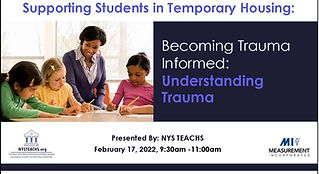Becoming Trauma Informed to Support Students Experiencing Homelessness
This three-part series is an introduction to becoming trauma informed. It is recommended that you attend all three sessions as each session connects to the information in the prior session. At the conclusion of this three-part series, participants will be able to:
-
Describe the types of traumas and the impact on the brain and behavior.
-
Identify strategies to create safe and supportive school environments in your role as a McKinney-Vento liaison.
-
Apply knowledge and strategies for self-care and coping with secondary traumatic stress.
Session 1: Understanding Trauma
This session will focus on building a foundation of knowledge to understand trauma and its impact on the brain and behavior. Key terms, including stress, chronic stress, and trauma will be explained to develop a common language and understanding. Opportunities will be provided to explore the types of trauma and examples of trauma and chronic stressors. will be explored.
Session 2: Practices and Strategies for Safety and Support
This session will provide an overview of the principles of trauma-sensitive or -informed care. Opportunities will be provided to explore strategies to create safe and supportive environments that account for brain functioning under stress or trauma. Participants will reflect on how these strategies and practices can apply to their work in the liaison role.
Session 3: Self-Care and Coping with Secondary Traumatic Stress
This session will focus on the application of the knowledge and concepts explored in becoming trauma informed to experiences in the liaison role. Opportunities will be provided to engage in discussion on the types of risks and stressors encountered in working with families and students experiencing homelessness and strategies to identify and cope with these challenges. Participants will then connect and share their own support and self-care strategies followed by an overview of the supports and services provided by NYS TEACHS.






